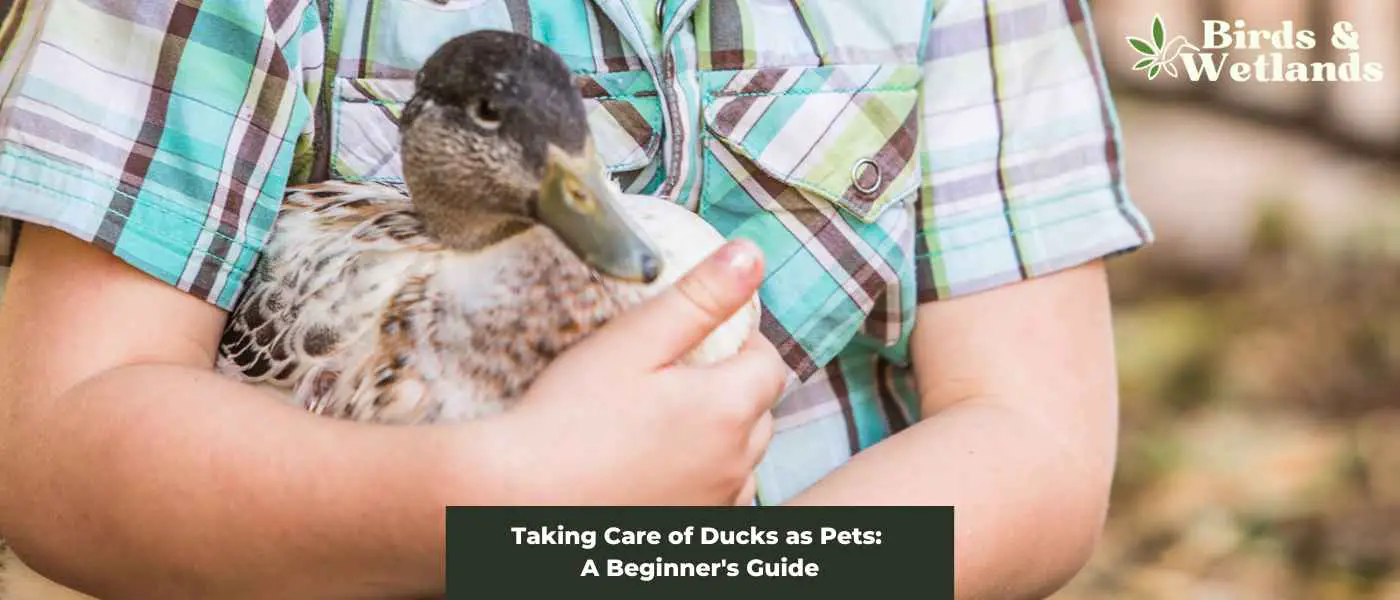Taking care of ducks as pets requires understanding their needs. Provide a safe, predator-proof coop for shelter. Ducks need plenty of water, not just for drinking but also for swimming and grooming. They need a diet of waterfowl feed, vegetables, and occasional treats. Regular vet check-ups are crucial, as are ways to keep them mentally stimulated. Lastly, remember ducks are social animals, so it’s better to have more than one.
Key Takeaways
Pet ducks need space: Ducks aren’t suitable for small apartments or homes without outdoor space. A large farm or a home with a fenced yard is ideal. Remember for healthy ducks, you will need several as they can get lonely.
Source your ducks responsibly: When raising ducks consider adopting ducks from rescue groups rather than commercial hatcheries.
Existing pets and children need training: Introducing a duck to pets like dogs and cats needs careful consideration to prevent stress or injury (and you will need to teach children how to hold a duck). Children also need to be taught how to handle ducks (and duck eggs) with care.
Create a safe habitat: Ducks need a large area to roam freely. This includes safe play toys and a dedicated sleeping area within the home.
Safety first: It’s crucial to provide shelter to protect your ducks from predators and harsh weather conditions.
Ducks love water: A small pond or a children’s pool can provide the ducks with a much-loved swimming spot.
Nutrition is key: Ducks need clean water and non-medicated food daily. Treat them with fruits, vegetables, and worms, and avoid feeding them food with little to no nutritional value.
Regular health checks are crucial: Although annual vet visits aren’t necessary, keep a close eye on any signs of injury or sickness.
Getting Started with Pet Ducks
If you are considering taking care of ducks as pets, there are a few things to consider before bringing them home. Here are some key factors to keep in mind:
Choosing the Right Breed
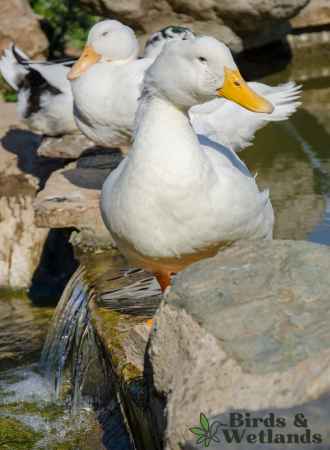
There are many different breeds of ducks, each with their own unique characteristics and care requirements. Some breeds are better suited for backyard flocks, while others are more suitable for commercial purposes. When choosing a domestic duck breed, consider factors such as size, temperament (particularly of female ducks), egg-laying ability, and overall hardiness.
Some popular pet duck breeds include:
Pekin ducks: A large, docile breed that is easy to care for and great for beginners.
Khaki Campbell ducks: A smaller breed that is known for its excellent egg-laying ability.
Runner ducks: A slender, upright breed that is active and entertaining to watch.
Domestic ducks are very different to wild ducks, most cannot fly and they have been adapted over many years to be more docile and provide more duck eggs.
Preparing for Your New Pet
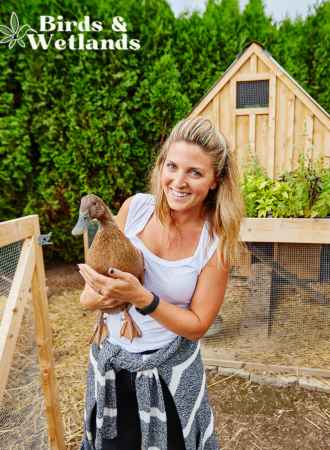
Before getting a duck as a pet, it is important to prepare for their arrival. Here are some key steps to take:
Research local laws and regulations regarding pet ducks in your area.
Purchase or build a suitable shelter for your ducks, such as a coop or duck house.
Purchase necessary supplies, such as feeders, waterers, and bedding – they will need access to fresh water for drinking and swimming.
Consider the cost of ongoing care, including feed, bedding, and veterinary expenses.
Housing and Shelter
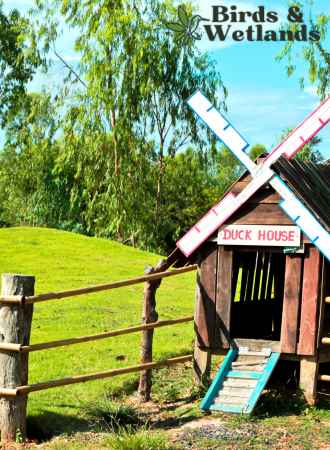
Ducks require a safe, secure shelter to protect them from predators and the elements. Here are some key factors to keep in mind when setting up housing for your pet ducks:
Provide at least 4-6 square feet of indoor space per duck, and 10-15 square feet of outdoor space for adult ducks. How many ducks you buy will depend on your space availability.
Use sturdy fencing or netting to enclose your duck’s outdoor space to keep ducks safe and protect them from predators.
Provide a clean, dry area for your ducks to sleep and lay eggs.
Use bedding such as straw or wood shavings to keep the coop clean and dry.
Have plenty of fresh food and places for them to forage in just as a wild mallard would.
TRIXIE Pet Products Natura Duck Coop
Are you looking for a reliable, safe, and accommodating living space for your ducks? The TRIXIE Pet Products Natura Duck Coop is the perfect abode that combines function, comfort, and durability, ensuring your ducks enjoy their surroundings.

Pros
- Spacious Design: The TRIXIE Pet Products Natura Duck Coop provides ample space for your ducks to roam and rest comfortably, promoting their well-being and happiness.
- Convenient Cleaning: With a pull-out plastic tray, this duck coop makes cleaning a breeze, helping maintain hygiene without the usual hassles.
- Robust Construction: Made of glazed pine, this coop is built to withstand the elements, ensuring a long-lasting and sturdy home for your ducks.
- Security: The hinged roof with locking arm can be opened from above, providing easy access while also ensuring your ducks’ security against potential predators.
- Easy Assembly: With all necessary hardware included and a detailed instruction guide, setting up your TRIXIE Pet Products Natura Duck Coop is a simple and straightforward process.
Cons
- Size Limitation: While the TRIXIE Pet Products Natura Duck Coop offers ample space, it may not be suitable for a large flock of ducks. Owners with a significant number of ducks may need to consider additional or larger housing options.
- Lack of Insulation: The design of the coop may not provide adequate insulation in extremely cold climates. Additional measures may be necessary to keep your ducks warm during harsh winters.
Feeding Your Pet Duck
Taking care of a pet duck involves feeding it a balanced and nutritious diet. Here are some things to keep in mind when feeding your pet duck.
What to Feed Your Duck
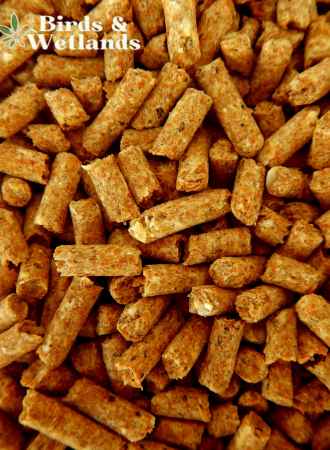
A commercially available, pelleted duck feed should be the base of any pet duck’s diet since it is complete and balanced. You should give it duck food that contains 18-20% protein until it is 3 weeks old, you can get food especially formulated for baby ducklings.
After that time, you can switch to chicken food that is supplemented with some fresh vegetables, like lettuce and carrots. Leafy greens, earthworms, mealworms, green peas, corn kernels, and other items are healthy additives to your duck’s daily meals. Domesticated ducks should also have access to clean water at all times.
Best Duck Feed Pellets
Are you a duck owner looking for the perfect feed to keep your feathered friends happy and healthy? Look no further than Purina Duck Feed Pellets! With their nutritionally balanced formula and high-quality ingredients, these pellets are the ultimate solution for providing your ducks with the nutrition they need to thrive.
Pros
- Complete Nutrition: Purina Duck Feed Pellets are nutritionally balanced to provide all the essential vitamins and minerals that ducks need to stay healthy and strong.
- Easy to Digest: The pellets are specially formulated to be easy to digest, which makes them ideal for ducks of all ages.
- Promotes Growth and Development: With its balanced nutrition formula, Purina Duck Feed Pellets are designed to support healthy growth and development in ducks.
- Suitable for All Breeds: Whether you have domestic ducks or wild ducks, Purina Duck Feed Pellets are suitable for all breeds of ducks.
- Trusted Quality: Purina has been producing high-quality animal feed for over 100 years, so you can trust that your ducks are getting the best possible nutrition with Purina Duck Feed Pellets.
Cons
- Cost: Compared to other types of duck feed on the market, Purina Duck Feed Pellets can be slightly more expensive. However, many customers feel that the high-quality ingredients and balanced nutrition formula are worth the extra investment.
- Pellet Size: Some customers have noted that the pellet size of Purina Duck Feed Pellets can be quite large, which may not be suitable for smaller or younger ducks. However, many customers have reported that the pellets can easily be broken up or soaked in water to make them easier to eat.
How Much to Feed Your Duck
Ducks should be fed daily with their pelleted food in the morning. The amount of food to feed your duck depends on its age and size. A general guideline is to feed your duck about 1/4 to 1/3 cup of pellets per day for every pound of body weight.
Overfeeding your duck can lead to obesity, which can cause health problems. It’s important to monitor your duck’s weight and adjust its diet accordingly.
Best Overall Duck Feeder -FeatherEase Automatic Chicken Waterer & Feeder
Simplify Your Poultry Care with One Smart Solution!
Enhance your poultry care with the FeatherEase Automatic Chicken Waterer & Feeder, a convenient and efficient solution designed to keep your ducks and chickens well-fed and hydrated.

Pros
- Simplify your poultry care routine: Dual-function design combines an automatic waterer and feeder in one convenient unit.
- Save time and effort: Large feeder and waterer capacities reduce the need for frequent refill.
- Save money: Innovative no-waste feeding system minimizes feed spillage and waste.
- Long lasting: Food-grade, BPA-free materials ensure the safety and health of your poultry, while the durable constructio.
- Easy-to-assemble and maintain design simplifies the process of keeping your poultry hydrated and well-fed.
Cons
- Users with hard water may experience difficulty in separating the inner cup from the main cup of the waterer due to mineral buildup.
- The feeder’s holes may be too large for some users, allowing chickens to scatter food out, which could result in waste.
- The waterer may not function effectively in colder climates, requiring alternative solutions during the winter months.
When to Feed Your Duck
Ducks should be fed at the same time every day to establish a routine. It’s best to feed your duck in the morning so that it has all day to digest its food. If there is any leftover food at the end of the day that has gotten wet, it should be discarded. Ducks should not need to be bathed as long as they have access to water in which they can submerge themselves.
You can provide your pet duck with treats like fruits, vegetables, and grains. However, treats should not make up more than 10% of your duck’s diet. Avoid feeding your duck bread, crackers, or other human junk food, as they are not nutritious and can cause health problems.
Keeping Your Pet Duck Healthy
As a pet owner, keeping your duck healthy is crucial. Here are some tips to help you keep your pet duck healthy and happy.
Common Health Problems
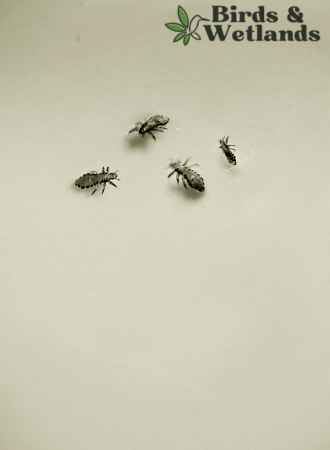
Ducks are generally hardy creatures, but they can still suffer from a variety of health problems. Some of the most common health problems in ducks include:
Parasites: Ducks can be infested with lice, mites, and other parasites that can cause skin irritation and other health problems.
Avian cholera: This is a bacterial disease that can cause sudden death in ducks.
Aspergillosis: This is a fungal disease that can cause respiratory problems in ducks.
Preventing Health Problems
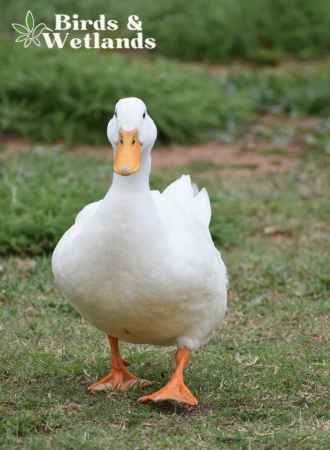
Preventing health problems is the best way to keep your pet duck healthy. Here are some tips to help you prevent health problems in your pet duck:
Keep your duck’s living area clean: Ducks produce a lot of manure, which can attract bacteria and parasites. Clean their living area regularly to prevent the buildup of bacteria and parasites.
Provide clean water: Ducks need clean water to drink and to swim in. Change their water daily to prevent the buildup of bacteria and other harmful substances.
Provide a balanced diet: Ducks need a balanced diet to stay healthy. Feed them a diet that includes a mix of commercial feed and fresh vegetables and fruits.
Vaccinations and Veterinary Care

Vaccinations and veterinary care are essential to keeping your pet duck healthy. Here are some things to keep in mind:
Vaccinations: Ducks can be vaccinated against some diseases, such as avian influenza and duck viral enteritis. Talk to your veterinarian about which vaccinations are appropriate for your pet duck.
Veterinary care: If your pet duck shows signs of illness, it’s important to take them to a veterinarian as soon as possible. Your veterinarian can diagnose and treat any health problems your duck may have.
Socializing with Your Pet Duck
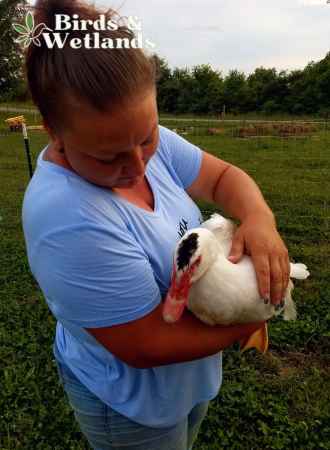
Ducks are social animals and enjoy spending time with their owners. Socializing with your duck can help strengthen your bond and improve their overall well-being. In this section, we will cover some tips for bonding, training, and playing with your pet duck.
Bonding with Your Duck
Bonding with your duck is an essential part of owning a pet duck. Spending time with your duck, talking to them, and offering them treats can help build trust and strengthen your bond. Ducks also enjoy snuggles and being held, but it’s important to approach them slowly and gently to avoid scaring them.
Training Your Duck
Training your duck can be a fun and rewarding experience for both you and your pet. Ducks can learn simple commands like “come” and “stay,” but it’s important to be patient and consistent with your training. Positive reinforcement, such as treats and praise, can help encourage good behavior.
Playing with Your Duck
Playing with your duck can help keep them entertained and mentally stimulated. Ducks enjoy toys like balls, mirrors, and puzzles. You can also play games with your duck, such as hide and seek or fetch. It’s important to supervise your duck during playtime and avoid any toys that could be harmful, such as small or sharp objects.
Duck Behavior and Communication
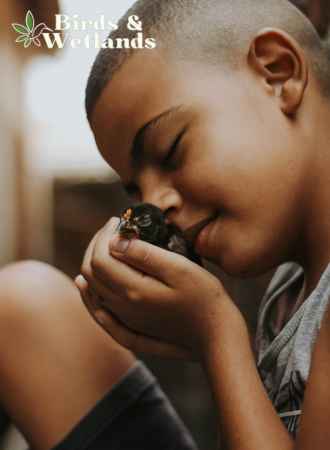
Ducks are fascinating creatures with unique behaviors and communication methods. As pets, it’s essential to understand their behavior to provide them with the best care possible. This section will cover the three main aspects of duck behavior and communication: Understanding Duck Behavior, Duck Communication, and Duck Socialization.
Understanding Duck Behavior
Ducks are social creatures and enjoy the company of other ducks. They can become depressed and lonely if kept alone for extended periods. If you plan to keep ducks as pets, it’s essential to have at least two ducks to keep each other company.
Ducks are also active and noisy creatures. Some breeds are more talkative than others, so it’s essential to choose a breed that fits your lifestyle. Pekin ducks, for example, are known to be friendly and calm, while other breeds can be more active and noisy.
Ducks are also grazing animals and spend most of their day eating. They also love swimming and will spend a significant amount of time in the water. Providing your ducks with a large pond or pool is essential for their well-being.
Duck Communication
Ducks communicate with each other through a variety of sounds and body language. They use different vocalizations to indicate different things, such as danger, food, or mating behavior.
Ducks also use body language to communicate with each other. For example, they wag their tails when they get out of the water, indicating pleasure and enjoyment. They also flap their wings and make a lot of noise when they are excited or happy.
Duck Socialization
Ducks are social creatures and need to be socialized with other ducks from a young age. If you plan to keep ducks as pets, it’s essential to introduce them to each other at a young age to prevent aggression and fighting.
It’s also important to socialize your ducks with humans. Ducks can become friendly and enjoy petting and snuggles. They can also learn commands and play with toys.
Duck Housing and Environment
When it comes to keeping ducks as pets, proper housing and environment are crucial for their well-being. Ducks are outdoor pets, but they still need secure housing to keep them safe from predators and inclement weather. In this section, we will discuss the different types of housing and environment that ducks need.
Indoor Housing
Ducks need indoor housing for protection from predators, inclement weather, and for laying eggs. The indoor housing should be spacious enough to allow ducks to move around freely. Each duck needs at least 4 square feet of space, and large breed ducks need at least 5 square feet.
Ducks are active during the night, so they need more space than chickens. The indoor housing should be well-ventilated to prevent the buildup of ammonia and other harmful gases. A good ventilation system will also help to control the temperature and humidity inside the housing.
Outdoor Housing
Ducks need plenty of space to roam and swim during the day. Outdoor housing should be spacious enough to allow ducks to move around freely. It should also be secure enough to keep predators out.
The outdoor housing should include a shelter to protect ducks from inclement weather and provide shade during hot weather. The shelter should be well-ventilated to prevent the buildup of harmful gases.
Pond and Swimming Water
Ducks need access to swimming water to keep their feathers clean and healthy. They also need deep water to submerge their heads and clean their eyes and nostrils. Each duck can consume 4 cups of water daily. Thus, a small flock of 4 ducks may need a gallon of drinking water daily. Ducks can benefit from a pond or a swimming pool.
The pond should be at least 3 feet deep and have a gentle slope to allow ducks to get in and out of the water easily. The pond should be cleaned regularly to prevent the buildup of harmful bacteria.
Duck Predators and Safety
Ducks are vulnerable to various predators, including raccoons, turtles, snapping turtles, eagles, muskrats, owls, cats, foxes, possums, hawks, rats, skunks, and crows. As a pet owner, it is crucial to be aware of these predators and take necessary precautions to protect your ducks.
Common Duck Predators
Raccoons are one of the most common predators of ducks. They are nocturnal animals and can easily break into duck coops. Turtles and snapping turtles are also a threat to ducks, especially ducklings. They can snatch them from the water and eat them alive.
Birds of prey, such as eagles and hawks, are also a significant threat to ducks. They can swoop down and grab ducks from the water or the ground. Foxes and cats are also known to prey on ducks, especially during the night.
Protecting Your Ducks from Predators
To protect your ducks from predators, it is essential to have a secure fencing system around their coop. The fence should be at least 6 feet tall and buried at least 1 foot deep to prevent predators from digging under it. Hardware cloth is an excellent material to use for fencing as it is sturdy and difficult to chew through.
It is also crucial to keep your ducks locked up in their coop at night to prevent nocturnal predators from attacking them. You can install automatic door openers to ensure that the coop is securely closed at night.
Motion-Activated Animal Repellent & Sprinkler
Protect your ducks and other wildlife on your property with an innovative, eco-friendly motion-activated alert sprinkler.

Pros
- Humane and Effective: The Havahart 5277 sprinkler offers a non-toxic, chemical-free solution to alert you when ducks or other animals are near, ensuring their safety.
- Motion-Activated: Equipped with an infrared sensor, this device detects movement up to 35 feet away and releases a burst of water to catch your attention and help protect the animals.
- Adjustable Settings: Customize the sensitivity of the motion sensor and the spray duration to suit your specific needs and prevent false triggers.
- Easy Installation: The device is easy to set up and connects to a standard garden hose, making it simple to deploy in any area of your property.
- Environmentally Friendly: Powered by solar energy and utilizing water as an alert system, the Havahart 5277 is a sustainable and eco-conscious choice for your yard.
Cons
- Limited Coverage: The motion sensor covers a 100-degree arc, which may not be sufficient for larger areas or properties with multiple entry points for animals.
- Weather-Dependent: Since the device relies on solar power, its effectiveness may be reduced during periods of extended cloud cover or in heavily shaded areas.
Safety Precautions for Your Ducks
Apart from fencing and locking up your ducks at night, there are other safety precautions you can take to protect your ducks from predators. You can install motion-activated lights around the coop to scare away nocturnal predators.
You can also use hawk covers to protect your ducks from birds of prey when they are outside. Locking them up at night is crucial as many predators are most active during the night, which raises the question of when can ducks go outside.
FAQS on How to take care of ducks as pets
Can I keep more than one duck as a pet?
Yes, keeping more than one duck is not only possible but also recommended. Ducks are social animals and thrive in the company of their own kind. A lonely duck can become depressed, so it’s beneficial to have at least two ducks for companionship, making taking care of ducks as pets an important consideration.
Are baby ducklings hard to take care of?
Baby ducklings do require significant care and attention. This includes providing them with appropriate duck food from a pet store, fresh drinking water, and a warm, safe environment away from predators. Moreover, they’ll need social interaction with other ducklings for healthy development.
How long can ducks live?
Ducks can live for over a decade, sometimes even reaching 20 years with proper care. This lifespan is significantly longer than other birds such as chickens, making ducks a long-term commitment as pets. Their longevity, however, can provide a rewarding experience for those who love ducks.
What does a duck’s diet consist of?
A duck’s diet consists of poultry feed from pet stores, grains, vegetables, and an occasional treat of frozen peas. Avoid feeding ducks bread as it lacks the nutrients they need. Ducks also enjoy foraging for bugs and plants if they are allowed to free-range. Always provide clean water for them to drink.
What kind of housing do ducks need?
Ducks need a safe and well-ventilated duck house for shelter. Each duck requires about 4 square feet of space inside the house. The house should protect the ducks from predators, and also include a small pool or pond for them to swim. Ducks also need a yard space of about 15 square feet each for roaming and foraging.
Are ducks better pets than other birds?
Whether ducks are better pets than other birds such as chickens or geese often depends on individual preference and lifestyle. Ducks are hardy animals, and they can be more sociable and interactive with humans than chickens. Ducks also produce more eggs, which can be an added benefit for some pet owners. Ducks can be more sociable and interactive with humans than chickens, making many believe that ducks are a good pet.
What health problems are common in ducks?
Ducks are generally robust and hardy animals. Ducks can suffer from common poultry diseases like avian cholera, duck viral enteritis, and botulism, and ducks can get fleas. Regular vet checks, vaccinations, and maintaining clean living conditions can help prevent these health problems.

